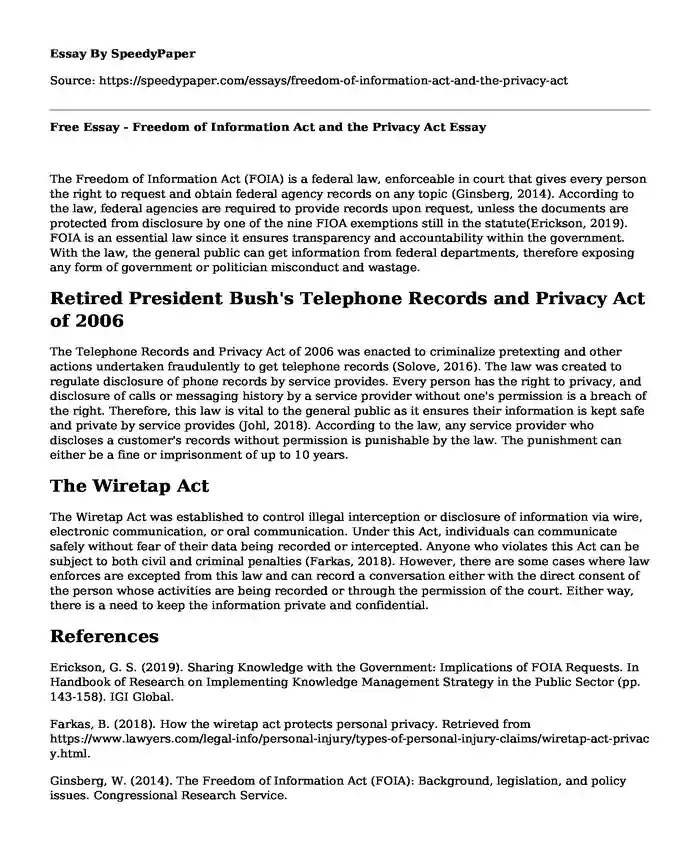
| Type of paper: | Essay |
| Categories: | Law Court system Judicial system |
| Pages: | 2 |
| Wordcount: | 429 words |
The Freedom of Information Act (FOIA) is a federal law, enforceable in court that gives every person the right to request and obtain federal agency records on any topic (Ginsberg, 2014). According to the law, federal agencies are required to provide records upon request, unless the documents are protected from disclosure by one of the nine FIOA exemptions still in the statute(Erickson, 2019). FOIA is an essential law since it ensures transparency and accountability within the government. With the law, the general public can get information from federal departments, therefore exposing any form of government or politician misconduct and wastage.
Retired President Bush's Telephone Records and Privacy Act of 2006
The Telephone Records and Privacy Act of 2006 was enacted to criminalize pretexting and other actions undertaken fraudulently to get telephone records (Solove, 2016). The law was created to regulate disclosure of phone records by service provides. Every person has the right to privacy, and disclosure of calls or messaging history by a service provider without one's permission is a breach of the right. Therefore, this law is vital to the general public as it ensures their information is kept safe and private by service provides (Johl, 2018). According to the law, any service provider who discloses a customer's records without permission is punishable by the law. The punishment can either be a fine or imprisonment of up to 10 years.
The Wiretap Act
The Wiretap Act was established to control illegal interception or disclosure of information via wire, electronic communication, or oral communication. Under this Act, individuals can communicate safely without fear of their data being recorded or intercepted. Anyone who violates this Act can be subject to both civil and criminal penalties (Farkas, 2018). However, there are some cases where law enforces are excepted from this law and can record a conversation either with the direct consent of the person whose activities are being recorded or through the permission of the court. Either way, there is a need to keep the information private and confidential.
References
Erickson, G. S. (2019). Sharing Knowledge with the Government: Implications of FOIA Requests. In Handbook of Research on Implementing Knowledge Management Strategy in the Public Sector (pp. 143-158). IGI Global.
Farkas, B. (2018). How the wiretap act protects personal privacy. Retrieved from https://www.lawyers.com/legal-info/personal-injury/types-of-personal-injury-claims/wiretap-act-privacy.html.
Ginsberg, W. (2014). The Freedom of Information Act (FOIA): Background, legislation, and policy issues. Congressional Research Service.
Johl, R. (2018). Reassessing wiretap and eavesdropping statutes: Making one-party consent the default. Retrieved from http://harvardlpr.com/wp-content/uploads/2018/03/Johl.pdf
Pfiffner, J. P. (2015). The Constitutional Legacy of George W. Bush. Presidential Studies Quarterly, 45(4), 727-741.
Cite this page
Free Essay - Freedom of Information Act and the Privacy Act. (2023, Mar 06). Retrieved from https://speedypaper.net/essays/freedom-of-information-act-and-the-privacy-act
Request Removal
If you are the original author of this essay and no longer wish to have it published on the SpeedyPaper website, please click below to request its removal:
- The Guilt of the Whites' Atrocities over the Natives - Free Essay on the Avatar Movie
- Free Essay Example on the Ethical Solution
- Effects of El Nino, Free Essay Example
- Essay Sample on Exhibition Review
- Equity method and Disclosures - Free Essay in Accounting
- Free Paper: Observational Research Report on McDonald's Restaurants
- Essay Sample on My House, My Boundaries
Popular categories




